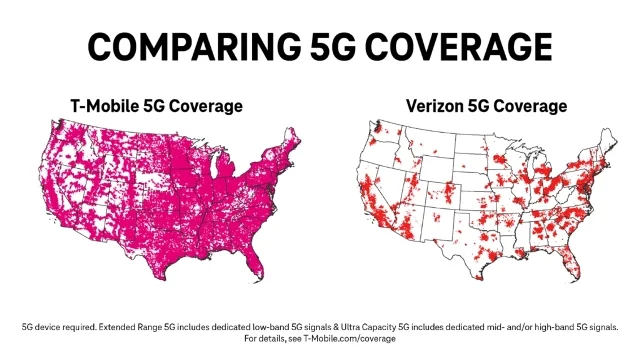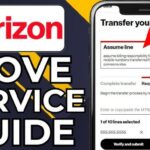Choosing between the top wireless carriers in the US often boils down to a head-to-head matchup: T-Mobile versus Verizon. Both offer extensive networks, fast speeds, and a range of plans packed with features. But asking “is t mobile better than verizon” doesn’t have a simple yes or no answer. The “better” carrier truly depends on your individual priorities, where you live and work, and what you value most in a mobile service provider. Let’s break down the key differences.

Network Coverage: Reach vs. Reliability
Network coverage is arguably the most critical factor, and here’s how they stack up:
The 5G Leader (T-Mobile)
T-Mobile has invested heavily in its 5G network, particularly using mid-band spectrum. This has resulted in T-Mobile having the most widespread 5G coverage across the United States, according to numerous independent reports. If having access to 5G service in more places is your top priority, T-Mobile currently holds the advantage. Their 4G LTE network is also robust, though historically considered slightly less expansive than Verizon’s.
Read more about: forward verizon phone
The Reliability Benchmark (Verizon)
Verizon has long held a reputation for having the most reliable overall network coverage, particularly with its extensive 4G LTE network that reaches a vast percentage of the US population. While its standard “5G Nationwide” coverage is broad, its high-speed “5G Ultra Wideband” network, known for incredibly fast speeds, is less geographically widespread than T-Mobile’s mid-band 5G, primarily concentrated in urban and suburban areas. If consistent connectivity and proven reliability, especially in fringe or rural 4G areas, are paramount, Verizon often excels.
Key Takeaway: Check both carriers’ coverage maps specifically for your frequent locations (home, work, travel routes) before deciding. T-Mobile likely offers more widespread 5G; Verizon often leads in overall perceived reliability.
Network Speed & Performance: Who’s Faster?
Speed tests consistently show a clear leader in average performance.
T-Mobile’s Speed Advantage
Recent independent network tests from sources like Ookla (Speedtest) and Opensignal consistently show T-Mobile offering the fastest average download and upload speeds nationwide, often by a significant margin compared to both Verizon and AT&T. This applies to both combined 4G/5G performance and often 5G-specific speed tests. T-Mobile also frequently ranks highly for network consistency.
Verizon’s Performance Profile
While T-Mobile leads in average speeds, Verizon is no slouch. Its 5G Ultra Wideband network delivers some of the fastest peak mobile speeds available where you can access it. Verizon also frequently scores well in specific 5G experience metrics like gaming and video streaming reliability in independent tests and maintains its strong reputation for overall network consistency.
Key Takeaway: If your priority is the highest average speeds across the board, T-Mobile currently leads. If you seek the absolute highest peak speeds (in specific Ultra Wideband areas) or value network reliability metrics highly, Verizon remains a strong contender.
Plans & Pricing: Value Proposition
Both carriers offer similar tiered unlimited plans, but differ in pricing structure and included perks.
Unlimited Plan Tiers
Both T-Mobile (Essentials, Go5G, Go5G Plus, Go5G Next) and Verizon (Unlimited Welcome, Unlimited Plus, Unlimited Ultimate) offer multiple unlimited options. Lower tiers provide basic unlimited data (often subject to slowdowns in congestion) with fewer features, while higher tiers add premium data (less likely to slow down), larger mobile hotspot allowances, and better perks.
Cost Comparison (Taxes Included?)
T-Mobile’s main Go5G plans often appear slightly less expensive, crucially because taxes and fees are typically included in the advertised price. Verizon’s advertised prices are usually pre-tax, making the final bill slightly higher. Both offer significant per-line discounts for family plans (multiple lines).
Perks and Features
This is a key differentiator. T-Mobile bundles perks like Netflix, Apple TV+, free in-flight Wi-Fi, and generous international texting/data benefits directly into its higher-tier Go5G plans. Verizon uses its “myPlan” system, where base plans are simpler, and customers can add specific perks (like the Disney Bundle, Apple Music, Walmart+, extra hotspot data, TravelPass days) for $10 each per month. This offers flexibility but can increase the total monthly cost if multiple perks are desired.
Key Takeaway: T-Mobile often provides better upfront value with bundled perks and inclusive pricing. Verizon offers more flexibility to pick and choose add-ons.
Prepaid Choices
Both carriers offer competitive prepaid plans that provide access to their networks without contracts or credit checks. Options range from low-data plans to unlimited tiers, often starting around $35-$50 per month (with autopay discounts). Comparing specific data amounts and current promotions is recommended if considering prepaid.
Customer Service Experience
Customer satisfaction rankings can fluctuate. Recent surveys (like PCMag Readers’ Choice) have often shown T-Mobile leading among the big three carriers in overall customer satisfaction. Other rankings (like ACSI) show them closely matched. Verizon typically performs very well in network quality studies (measuring fewer dropped calls and connection issues).
Key Takeaway: T-Mobile currently seems to have an edge in reported customer satisfaction, while Verizon often leads in network quality metrics.
Phone Deals and Promotions
Both T-Mobile and Verizon offer very similar, aggressive deals for new customers and phone upgrades. Expect “free” phone offers (via 24-month bill credits for T-Mobile, 36-month for Verizon) requiring trade-ins and specific unlimited plans. Both also offer Bring Your Own Device (BYOD) incentives. Compare specific offers when you’re ready to buy.
So, Is T Mobile Better Than Verizon? The Bottom Line
The answer to “is t mobile better than verizon” depends entirely on what you prioritize:
Choose T-Mobile If…
- You want the fastest average mobile speeds.
- You prioritize having the widest 5G network availability.
- You appreciate bundled perks like Netflix and extensive travel benefits included in your plan.
- You prefer straightforward pricing with taxes and fees often included.
- Recent customer satisfaction scores are important to you.
Choose Verizon If…
- Overall network reliability and coverage consistency (especially 4G) are your main concerns.
- You live/work in a 5G Ultra Wideband area and want access to potentially the highest peak speeds.
- You prefer the flexibility to choose specific plan add-ons à la carte via the myPlan system.
- Network quality metrics (fewest dropped calls/problems) weigh heavily in your decision.

